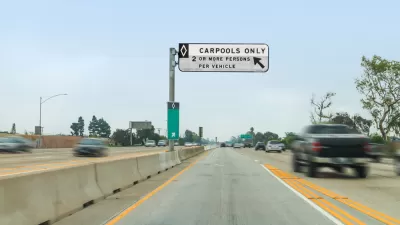You think your daily commute is bad? In one of the world's largest cities, a lack of citywide rapid transit means daily commutes of four hours for many Jakarta residents. Help is on the way, but conditions may get worse before they get better.
"Jakarta, with a metropolitan area populated by 28 million people, remains one of the world’s few major cities without a rapid-transit system, despite plans dating to the 1980s," notes Joe Cochrane. "The closest substitute, the TransJakarta Busway, carries fewer than 400,000 people a day. And a dedicated bus lane during peak hours, when the roads are clogged, does not help, as cars, motorcycles and even government, police and military vehicles illegally drive over the tiny concrete barriers that are supposed to block it off, further delaying the buses."
"But help may finally be on the way," he explains. "Jakarta, the Indonesian government and consortiums of private investors are pouring $4 billion into public transportation infrastructure projects scheduled to start between this October and 2015. They include the first stage of a subway and aboveground rail system linking south and central Jakarta; two monorail projects; an express train to the airport from central Jakarta; and an elevated train circling the outskirts of central Jakarta that would connect to existing provincial commuter rail lines west, south and east of the city."
"But with the first rapid-transit rail lines not scheduled to start operating for at least four years, and greater prosperity only adding to the numbers of cars and motorcycles on the roads, transportation experts warn that in the near term congestion is likely to worsen."
FULL STORY: Hours to Go, Just to Get to Work

Planetizen Federal Action Tracker
A weekly monitor of how Trump’s orders and actions are impacting planners and planning in America.

Map: Where Senate Republicans Want to Sell Your Public Lands
For public land advocates, the Senate Republicans’ proposal to sell millions of acres of public land in the West is “the biggest fight of their careers.”

Restaurant Patios Were a Pandemic Win — Why Were They so Hard to Keep?
Social distancing requirements and changes in travel patterns prompted cities to pilot new uses for street and sidewalk space. Then it got complicated.

Platform Pilsner: Vancouver Transit Agency Releases... a Beer?
TransLink will receive a portion of every sale of the four-pack.

Toronto Weighs Cheaper Transit, Parking Hikes for Major Events
Special event rates would take effect during large festivals, sports games and concerts to ‘discourage driving, manage congestion and free up space for transit.”

Berlin to Consider Car-Free Zone Larger Than Manhattan
The area bound by the 22-mile Ringbahn would still allow 12 uses of a private automobile per year per person, and several other exemptions.
Urban Design for Planners 1: Software Tools
This six-course series explores essential urban design concepts using open source software and equips planners with the tools they need to participate fully in the urban design process.
Planning for Universal Design
Learn the tools for implementing Universal Design in planning regulations.
Heyer Gruel & Associates PA
JM Goldson LLC
Custer County Colorado
City of Camden Redevelopment Agency
City of Astoria
Transportation Research & Education Center (TREC) at Portland State University
Camden Redevelopment Agency
City of Claremont
Municipality of Princeton (NJ)




























